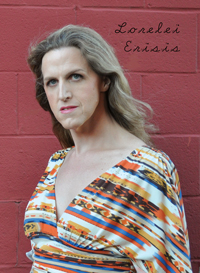By: Lorelei Erisis*/TRT Columnist—
The thing I’m going to talk to you all about this month is the film “The Danish Girl.” Let be right up front about a few things. This isn’t a movie review, at least not a proper one. For one thing, by the time you read this, the movie will have been out for at least a month already. In today’s fast moving media cycles that’s an eternity. But part of the reason I like writing a monthly column is that I believe some things need time to think about—to run around in my head and come out as something more than just a gut response. It needs to be something thoughtful and hopefully insightful.
There are other reasons though, more important than the length of media cycles, which I routinely ignore. I’m a little too close to this film to give a properly or even nearly unbiased review. I was lucky enough to see it just before it opened, as part of a special screening for invitees to a White House event called, “LGBT Artists Champions For Change,” for which I was honored to be invited as a trans activist, writer and artist.
The screening took place at the Burke Theater in the U.S. Navy Memorial in Washington, DC following the White House event. There was a reception, with all sorts of fascinating folks and complimentary top shelf liquor that I thoroughly enjoyed.
I also walked the red carpet along with all the other celebrities in attendance. (Squeeeeee!!!!) And, I had my pictures taken by a bank of photographers. You can even search Getty Images for Lorelei Erisis and find me looking fabulous and very Jackie-O-esque!
During the course of the day and evening, I had the opportunity to talk to and take selfies with a number of the people involved in the making of “The Danish Girl,” including the two trans actors cast as cis supporting characters in the film: Rebecca Root and Jake Graf. Both of these actors are highly talented in their own right and I found to them be wonderfully charming. I would particularly recommend checking out the 2015 BBC TV Series “Boy Meets Girl” in which Root stars as a trans woman in an age gapped relationship for a great example of trans people telling our own stories. (Note: Don’t confuse it with the 2014 American film of the same name, starring a young trans actress named Michelle Hendley, which is amazing in itself. If you haven’t seen it, you should do so immediately!)
At the screening, I was right in the center of the front row, with my “girlboyfriend” next to me. It was that way because I’m a massive nerd, and also because it seemed to make an interesting statement to be right there; a visible trans woman, with her gender fluid trans partner, visible to the entire rest of the audience watching the film.
Afterwards there was a Q&A panel with the director, Tom Hooper; the two trans actors; the lead actress, Alicia Vikander; the screenwriter, and a couple of the producers; moderated by a representative from the Advocate. The panel was relatively interesting. I was impressed by the moderator’s questions, especially with the harder trans related questions about the film. [pullquote]Although Eddie Redmayne does really quite a good and respectful acting job—and honestly, I thought he was really super cute and nicely femme-y—I think that an actual trans actor in that role would have picked up on a number of the finer nuances of actually being trans that felt just, well, lost.[/pullquote]
Following the panel, I spoke with some of the folks I was sitting with and talked to a couple of the panel members. To my pleasant surprise, Tom Hooper came right up to me and asked what I thought about the movie. He took the time to listen to me and discuss my thoughts while other VIPs waited patiently for his attention. He even hugged me when we were done talking!
I should note here that I was one of only two audience members at the White House event earlier who had been able to ask a direct question at one of the panels—the “Inclusive Storytelling in Mainstream Media” panel specifically. Jill Soloway, the show runner and creator of the Amazon show “TransParent” was on the panel, along with Hooper and a mix of other folks from “TransParent” and “The Danish Girl.” I started my question by thanking Soloway for her interview with me when I reviewed the pilot of “TransParent” for The Rainbow Times a while back. I also thanked her for following through on her promise to cast trans actors and hire trans crew members and writers, if the show got picked up. To the collective panel, I asked, “Now, what’s it going to take to make the jump to trans people telling our own stories with the same level of media exposure and support?”
This drew spontaneous applause from the generally very polite audience. It was also apparently a big topic of discussion among many of the folks present for much of the rest of the day.
Back to my conversation with Tom Hooper and my feelings about the movie, “The Danish Girl.” Because of my earlier question and the reaction it received, I felt obligated to be direct with my words. And, I’ll tell you what I told him: “I have extremely complex feelings about it.” I’ve since sorted through a lot of those feelings. But, they remain quite complex and rather conflicted.
First of all, I thought it was really a very good movie. Full disclosure, I dig Merchant-Ivory flicks, costume dramas and all sorts of Art House films. I’m also a sucker for history. And, if you’re like me in those respects, you will almost certainly enjoy “The Danish Girl.” It’s simply lovely. The cinematography is beautiful. The acting is top notch. The characters are intriguing and interesting. The costumes are so lovingly recreated you can almost feel the soft fabrics, which might have been intentional and something of a misstep. It certainly gives the film a fetish-y feeling in a number of respects that I felt confused the narrative in some slightly regrettable ways.
I have done my best to avoid reviews or chatter about the movie online. I wanted to have my own opinion. But one criticism I read, which resonated, was that it was a “forced feminization story,” which having dated a famous dominatrix for several years, I can tell you pretty confidently, it was not. (And no, I was not either.) But, I can easily see how one might get that idea. A lot of the story of Lili Elbe, the trans woman at the center of the story, is hard to parse. The filmmaker plays with the audience’s viewpoint in a number of interesting ways, revealing Lili’s backstory only in bits and snippets. Dramatically this makes for good tension and keeps the viewer interested. I think it is deliberately misleading in ways that are meant to be positive and to help drive the narrative, but which I believe also served to reinforce some UN-helpful trans stereotypes.
This brings me to my main problem with the film, which if you’ve read anything I’ve written previously, you can probably see coming from a mile away. Although Eddie Redmayne does really quite a good and respectful acting job—and honestly, I thought he was really super cute and nicely femme-y—I think that an actual trans actor in that role would have picked up on a number of the finer nuances of actually being trans that felt just, well, lost. There are little details that as a trans woman jarred me right out of the film. There were fine points relating to the sometimes odd experience of actually coming out as trans and being trans in the world that just didn’t quite work for me. [pullquote]But, it is the film it is and I have to defend it a bit too. I honestly believe Hooper and the rest of his cast and crew were doing the best they could under given circumstances to make a sympathetic and positive film.[/pullquote]
I also do not accept the argument that there simply weren’t any trans actors to draw from to cast this or other roles. I have heard this same argument used in defense of it. I am a trans actor. And although, in all fairness, I would not have been appropriate for the role myself, as an actor with professional connections, I have no doubt there are other trans actors out there who would have been perfect for it. To further counter the usual argument, while it’s true many of them do not have the “superstar name recognition” of a Redmayne or a Kidman, if we keep using this argument, if nobody takes a chance, how is any trans actor supposed to ever get that name recognition?
Staying completely honest, I told the director that there were some things in that movie that made me wince—some uncomfortably fetishistic attachments to female clothing, an extreme separation of personas between Lili the woman and Lili’s previous male persona of Einar.
These were details, I had to admit upon reflection, held quite true for many trans women’s experience. I even joked to Hooper that for about the first year of my own transition, I spoke with an odd Swiss accent, which I was absolutely dedicated to, whenever I was out “in girl mode”—a fact that anyone who knew me then can confirm as weird, but true.
As portrayed by a cis actor though, these already hard to accept bits of story just didn’t quite work for me. I truly believe a trans actor could have brought more artistry and authenticity to the role; and might even have spoken up about these details, which would have elevated this from a very good film to an amazing film!
I also struggled with it because the film was still another story about a trans woman that focused on the surgical aspects of our transition, and yet … that is the actual historical significance of Lili Elbe. We know who she is because she was the first person to undergo the modern precursor to today’s gender reassignment surgery. Trans audiences may also struggle, as I did, with a lot of language and references that feel very dated and uncomfortable in light of current understandings. But again, that’s a modern lens on historical accuracy—not negative marks, per se, but things that greatly contributed to the complexity of my feelings. [pullquote]I really think this is maybe more of a film for cis people to see—one that may lead them to a little greater sympathy for the lives of trans people.[/pullquote]
But, it is the film it is and I have to defend it a bit too. I honestly believe Hooper and the rest of his cast and crew were doing the best they could under given circumstances to make a sympathetic and positive film. They leaped a lot of hurdles just to get this film off the ground and finally made. And, as much as I love Nicole Kidman, the original casting choice for Lili Elbe, I thought Eddie Redmayne was a much better cis choice.
Hooper also did cast trans actors in cis roles, which rocks, although those small roles felt like a bit of an afterthought. They were well played, and he actually gave paying work to trans actors, so I’ll give him credit for it. And, of course, I can’t criticize those actors for taking the roles. It’s paid work in a high-profile film. I would have made the same choices.
It is no “Dallas Buyers Club” by any means! Hooper, Redmayne and company seem to have learned the lessons of that ugly debacle. Respect us, engage with our community in an honest, intelligent, and kind manner, and even if we don’t agree with your choices, we can keep the dialogue civil.
I will say that the one thing I feel has been overlooked about the film might even be the thing that makes it most worth seeing. I felt that the love story between Lili Elbe and her wife Gerde Wegener is the real center of this film. It’s honestly beautiful and I won’t lie to you, it made me cry. So often when trans stories are told, the story of our partners is either overlooked or very, very negative. It was nice to see a story of a partner of a trans person who sticks by them, is their greatest ally, and struggles positively to keep the love and the relationship alive.
If there were no other reason to recommend this movie, or not to, I’d still have to point at that relationship as a high mark.
Although it’s easy to assume from all the press materials and the focus on Lili Elbe, I felt that the title “The Danish Girl,” refers not so much to Lili as to her wife Gerde. Upon some reflection, it really seems that she was the main character, and that it is her lens through which we are meant to view the story. Gerde and her relationship with Lili represent the “entry point” for cis audiences.
Finally, here’s what I came away with and why at the beginning I said this was not going to be a proper movie review. As a trans person, I’m not absolutely sure I was the audience for, “The Danish Girl.” I do think there will be trans people who see it and see aspects of themselves. It’s far from perfect, but it gets a lot pretty close. I really think this is maybe more of a film for cis people to see—one that may lead them to a little greater sympathy for the lives of trans people. As I said, it’s a good movie. The acting overall is superb. And, that love story will give a lot of cis folks an emotional connection that will let them get lost in the story of Gerde Wegener and Lili Elbe.
Perhaps it is not a terrible thing to come away from a movie with complex feelings about it, even if it’s not perfect.
Meanwhile, I’ll be out here waiting and working for trans people to be able to tell our own stories in our own voices.
Slainte!
* Lorelei Erisis is an actor, activist, adventurer and pageant queen. Send your questions about trans issues, gender and sexuality to her at: askatranswoman@gmail.com.








